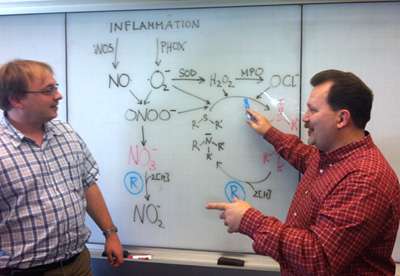Scientists find key to growth of 'bad' bacteria in inflammatory bowel disease

(Medical Xpress)—Scientists have long puzzled over why "bad" bacteria such as E. coli can thrive in the guts of those with inflammatory bowel disease (IBD), causing serious diarrhea. Now UC Davis researchers have discovered the answer—one that may be the first step toward finding new and better treatments for IBD.
The researchers discovered a biological mechanism by which harmful bacteria grow, edge out beneficial bacteria and damage the gut in IBD. This new understanding, published in the Feb. 8 issue of Science, may help researchers develop new treatments for IBD with fewer side effects than current therapies.
IBD begins when "good" bacteria are mistakenly killed by the immune system, while harmful bacteria multiply—resulting in inflammation and damage to the intestines, and chronic episodes of abdominal pain, cramping, diarrhea and other changes in bowel habits. It's estimated that IBD, which includes ulcerative colitis and Crohn's disease, affects 1.4 million people in the U.S., according to the Centers for Disease Control and Prevention.
In test-tube and animal studies, the researchers found that potentially harmful bacteria in the intestine called Enterobacteriaceae use nitrate—a byproduct formed during the intestinal inflammation in IBD—to grow and thrive. Enterobacteriaceae strains include certain E. coli bacteria, which can worsen the intestinal damage of IBD. Eventually, the intestines of those with IBD become overrun by harmful bacteria, and the numbers of normal good bacteria in the gut decrease.
"Much like humans use oxygen, E. coli can use nitrate as a replacement for oxygen to respire, produce energy and grow," said lead author Andreas Baumler, a professor of medical microbiology and immunology at UC Davis.
"In IBD, nitrate produced by inflammation in the gut allows E. coli to take a deep 'breath,' and beat out our beneficial microbes in the competition for nutrients," he said.
The inflammation in the intestines of those with IBD leads to the release of nitric oxide radicals that are powerful in attacking bacteria, Baumler explained. Yet these nitric oxide radicals are also very unstable, and eventually decompose into nitrate, which can be used by bacteria like E. coli to thrive and grow. By contrast, good bacteria in the gut grows through fermentation—a much slower process.
Determining the reasons why bacteria like E. coli can edge out good bacteria in the gut is crucial for determining new ways to halt the IBD disease process, according to Baumler. Current treatments for IBD suppress the immune response through antibiotics, corticosteroids or other powerful immune-modifying drugs. But long-term side effects can limit their use and their effectiveness for IBD patients.
The UC Davis team's research indicates that targeting the molecular pathways that generate nitric oxide and nitrate, as well as other molecules that feed harmful gut bacteria, could calm down and normalize the intestinal environment in IBD, Baumler noted. They are already doing research with one candidate drug that could halt the multiple pathways by which harmful bacteria thrive in IBD.
"The idea would be to inhibit all pathways that produce molecules that can be used by bacteria such as E. coli for respiration and growth," Baumler said. "Essentially you could then smother the bacteria."
More information: "Host-Derived Nitrate Boosts Growth of E. Coli in the Inflamed Gut," by S.E. Winter et al. Science, 2013.










.jpg)





